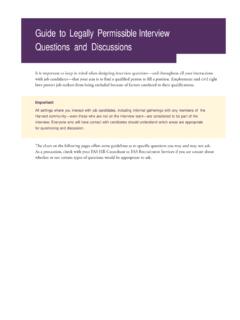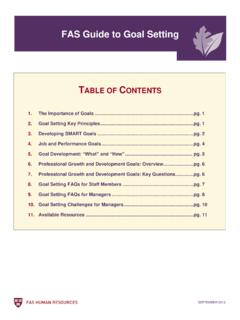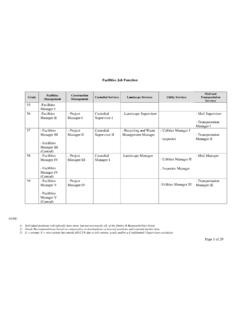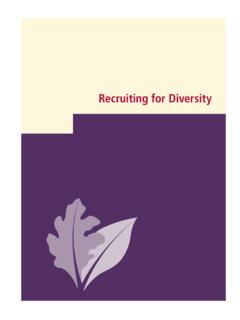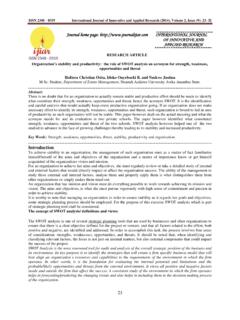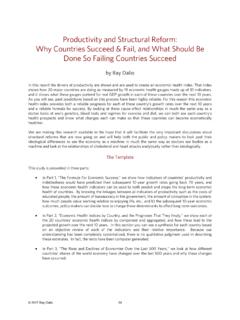Transcription of Performance Management Coaching as Conversation
1 Performance Management Coaching as Conversation Performance Management , as we have come to know it, is changing for most employees. The era of the annual Performance review discussion is in the rearview mirror. In many organizations, including Harvard, managers are encouraged to provide regular input to employees through ongoing Coaching conversations. While early signs indicate that this is a better approach, some help may be needed on how to approach this new normal. Below is some guidance for having these conversations. Identify Strengths and Approaching the Conversation Providing Constructive Criticism Discuss Development Set aside time and keep to it. Regular, Acknowledge success. Recognize your Frame your guidance. Begin by sharing your recurring meetings provide continuity to employees' accomplishments and help intent: to help your employee to improve your conversations.
2 Them to identify their strengths, based on and/or grow. Be on time. This signals to your employee your perspective and observations. Start from a positive place. Set the tone by that this Conversation is important to you. Be specific when praising. Take the time to beginning with something positive. Be intentional. Think in advance about what understand what your employee did and Coaching you want to provide. Focus on why it was so great. Be as specific and as Be timely. Try to provide feedback in a these topics. thorough as possible. timely way, so an employee can directly connect the feedback to recent behavior or Be fully present. Think of these meetings as Talk about your employee's career actions. an important time to really connect with growth . When possible, give employees the your employees.
3 Avoid the temptation to opportunity to discuss long-term goals. Be brief and specific. Describe the situation, check your devices or pick up a phone call. give specific examples of the employee's Find what is needed. Talk with your actions, and/or behavior and discuss Listen. Active listening is essential for employees about relevant trainings and impact. Offer suggestions for different building trust and solidifying your other learning opportunities that might approaches so your employee understands relationship with your employee. Listen with help them grow their skills and/or take the how they might approach similar situations the intent to understand, not to defend next step in their career. differently next time. when your employee responds to your Coaching . Contemplate new challenges. Discuss Don't make it personal.
4 Keep your guidance stretch opportunities with your employee focused on the work, not the person. Discuss what 's happening now. Find out in an effort to identify areas in which they Discuss changes that would be helpful what the employee is working on and what can stretch their skills. within the context of behaviors and actions. the challenges they're facing. Connect development with goals. When Think of yourself as a GPS. If you guide Focus on guidance. Don't let the fact that possible, help your employee to identify your employee on an ongoing basis with you might not be able to provide a solution those areas they need to develop in order some frequency, any issues that arise will make you reluctant to offer your perspective to accomplish their stated goals. be easier to solve. Less time off road.
5 On a problem. makes it easier to get back on track. Performance Management Coaching in Conversation Set the stage for this new normal. Regular conversations are part of the annual Coaching conversations increase Let your employee know that you would like Performance Management process. productivity and engagement. to use some of your regular time together to Ongoing conversations help to align Research indicates that having regular coach them on Performance . Be transparent employees and managers regarding the Coaching conversations increases employee about this so they are aware. employee's Performance . productivity and overall development. Coaching Conversation Starters Below are some examples for how to start conversations and how to tee up certain topics: General Coaching Development I have some thoughts to share on the work you just completed on X Do you have the chance to work on projects that use your skills and project.
6 Is this a good time to do that? expertise in the best way? Are there projects or areas you'd like to Next time you work on X project or with Y person, what might you work on if you had the chance? keep in mind? Is there anything you might approach differently? Given the opportunity, which skills and/or competencies would you what went well regarding the project you worked on? most like to develop? what have you tried so far on X project? what might be some other what is most important to you in your work? options? what are your key priorities as you think about your career? How what did you learn on this project? Were certain skills required you does that connect to your current work? felt you needed but didn't have? Are there things you'd like to accomplish that you don't yet feel I'm going to describe a problem I see.
7 I may be wrong and, if so, I hope prepared to do? If so, what 's the nature of the gap?'. you'll tell me. If I'm not, let's discuss ways to address it. what do you need to do next, and is any of this unclear to you? If so, Constructive Criticism can you say more? I have some feedback that might be difficult to hear. Are you open to what 's one thing I can do to help you? hearing these thoughts? Based on my own observations, you may be engaging in some Team and Environment behaviors that are getting in your way. Can we discuss this? what are your favorite aspects of our department/group/team? what do you think worked with X assignment, and what could have what might you change and why? gone better? How can I support you in X project? In your long-term goals? How might you do things differently next time?
8 what are some things you'd like to see more of from me? Updated 2/26/18.
